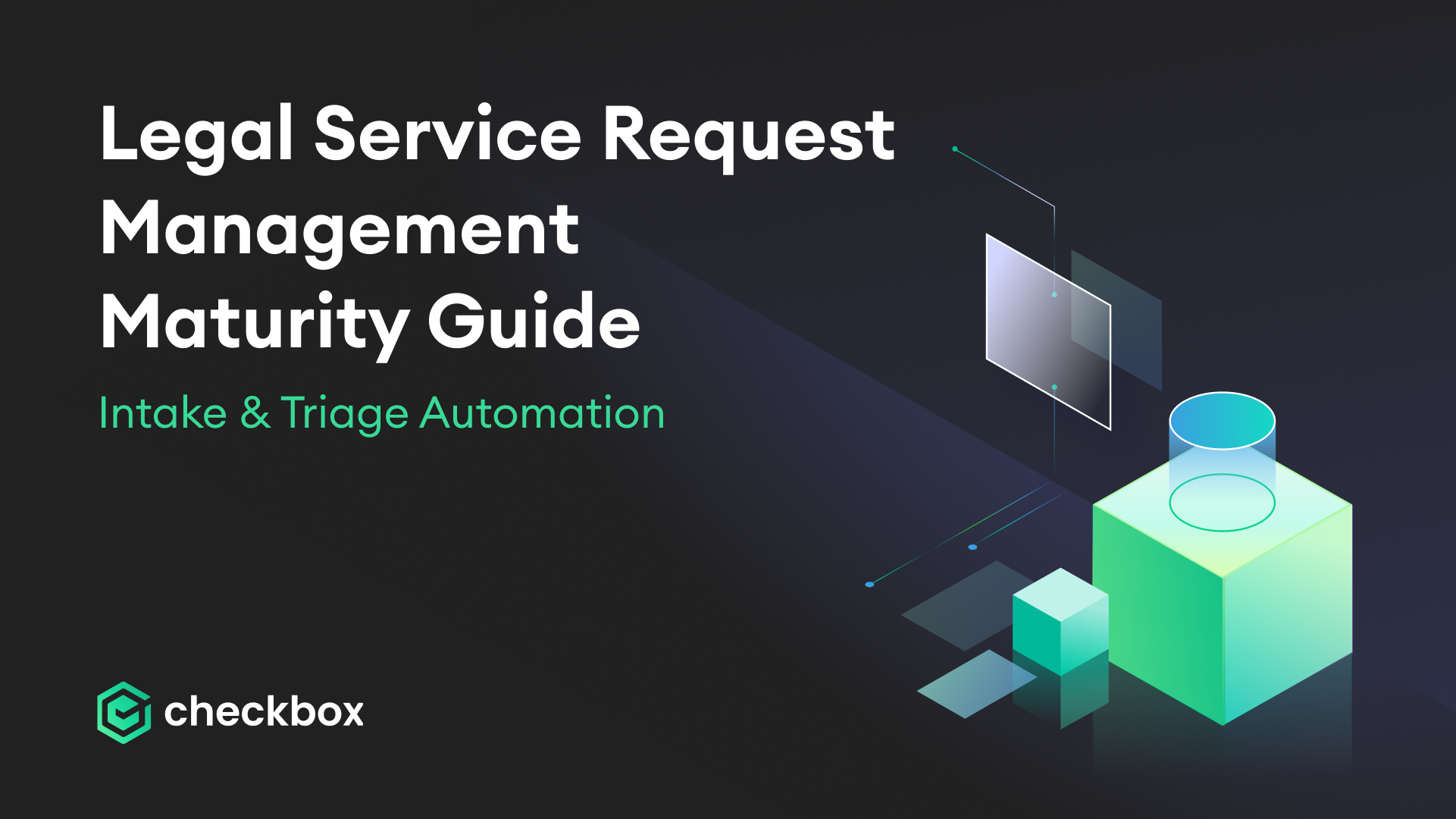
Sign up to our newsletter
Get insightful automation articles, view upcoming webinars and stay up-to-date with Checkbox
Reading time:
[reading time]

What is Contract Management Software?
Contract management software is a digital tool designed to automate and streamline the entire contract lifecycle, from creation to execution and expiration.
It helps businesses manage their contracts more efficiently by providing features such as contract drafting, approval workflows, digital signatures, contract storage, and reporting. Contract management applications also help businesses stay compliant with legal and regulatory requirements by providing alerts for key dates and milestones, and by tracking contract performance and obligations.
Overall, contract management software helps businesses save time and money, reduce risk, and improve their overall contract management process.
Use Cases for Contract Management Software
There are various use cases for contract management software that are designed to simplify and streamline the entire contract lifecycle, from creation to execution and beyond.
✍️ Contract Creation
Contract management software helps businesses create contracts more efficiently by providing templates, clause libraries, and contract drafting tools. It also allows businesses to automate the creation of certain types of contracts, such as renewals or amendments, by pre-populating fields and using workflow rules.
📂 Contract Storage and Retrieval
Contract management systems provides a centralized repository for all contracts, making it easy for businesses to store, organize, and retrieve contracts quickly and securely. It also provides version control, so users can access the latest version of a contract and track changes over time.
⏱️ Contract Tracking and Monitoring
Contract management software helps businesses track the status and performance of contracts, including key dates and milestones, obligations, and deliverables. It provides alerts and notifications for upcoming deadlines and ensures that all parties meet their obligations.
🤝 Contract Negotiations
Contract management software enables businesses to collaborate on contract negotiations in real-time, both internally and with external parties. It provides tools for redlining and version control, making it easy to track changes and iterations of a contract.
✅ Contract Compliance
Contract management software helps businesses stay compliant with legal and regulatory requirements by providing alerts for key dates and milestones, and by tracking contract performance and obligations. It ensures that all parties meet their obligations and that the terms of the contract are enforced.
📊 Contract Analysis and Reporting
Contract management software provides analytics and reporting tools, enabling businesses to analyze contract data and identify trends, risks, and opportunities. It allows users to generate reports on contract status, performance, and compliance.
🔍 Improved Contract Visibility
Contract management software provides a single, unified view of all contracts, making it easy for users to access and review contract information. It improves transparency and visibility, enabling businesses to manage contracts more effectively.
🔁 Contract Renewal and Extension Management
Contract management software helps businesses manage contract renewals and extensions by providing alerts for key dates and milestones, and by automating the renewal process. It allows users to track and manage renewals and extensions in one central location.
🧑💼 Contract Collaboration
Contract management software provides tools for collaboration and communication, enabling users to work together on contract-related tasks and documents. It allows for real-time collaboration and feedback, making it easy for teams to work together on complex contracts.
⤵️ Contract Workflows
Contract management software provides workflow automation tools, enabling businesses to automate the entire contract lifecycle. It allows users to create custom workflows and approval processes, ensuring that contracts are created, reviewed, and executed efficiently and accurately.
What is the Difference Between CLM & Contract Management Software?
Contract Lifecycle Management (CLM) and Contract Management Software (CMS) are terms that are often used interchangeably, but they refer to slightly different concepts.
Contract Lifecycle Management (CLM) is a comprehensive approach to managing the entire contract lifecycle, from initial request to contract execution, post-contract obligations, and termination. It involves a combination of people, processes, and technology to manage contracts effectively, including contract creation, negotiation, approval, execution, monitoring, and analysis.
Related Article: Learn more about Contract Lifecycle Management (CLM) and what it means for in-house legal teams.
Contract Management Software, on the other hand, is a technology tool designed to automate and streamline various aspects of the contract management process. It provides features such as contract drafting, approval workflows, digital signatures, contract storage, and reporting, and helps businesses manage their contracts more efficiently.
While contract management software is a critical component of CLM, it is not the only factor. CLM requires a more comprehensive approach that involves people and processes, in addition to technology. It also includes activities such as contract strategy, risk management, stakeholder engagement, and continuous improvement.
Overall, CLM is a holistic approach to managing the entire contract lifecycle, while contract management software is a tool that supports specific aspects of the contract management process.
| Contract Management Software | Contract Lifecycle Management |
|---|---|
| Focuses on managing contracts after they have been executed | Covers the entire contract lifecycle from start to end |
| Provides features for contract storage, tracking & management | Includes contract authoring, negotiation & e-signature |
| Enables users to set reminders and notifications for key contract milestones & deadlines | Provides analytics & reporting tools to optimize the contract process |
| Includes reporting & analytics tools to monitor contract performance | Integrates with other systems, such as CRM & ERP software |
| Provides version control & audit trail functionality | Includes workflow automation features |
| Includes features for managing contract amendment & renewals | Provides collaboration tools to enable teamwork |
Why Use Contract Management Software?
Contract management software is an essential tool for businesses that manage a large number of contracts. It streamlines the entire contract lifecycle, automating routine tasks such as contract creation, approval workflows, and digital signatures. It helps organizations manage contracts more efficiently and effectively, reducing costs, minimizing risks, and increasing visibility.
Contract management software improves collaboration, provides analytics and reporting tools, and ensures compliance with contract terms and obligations. By using contract management software, businesses can save time, reduce errors, and gain valuable insights into their contract management process, enabling them to make informed decisions and achieve their business goals.
What to Look For in a Contract Management Software?
When choosing a contract management software, there are several key factors to consider:
- Ease of use: The software should be intuitive and easy to use, with a user-friendly interface that allows users to access and manage contracts quickly and easily.
- Features: The software should offer a range of features that support the entire contract lifecycle, including contract creation, storage, and retrieval, tracking and monitoring, compliance, collaboration, workflows, and reporting.
- Customizability: The software should allow users to customize workflows, templates, and reports to meet their specific needs. It should be flexible enough to adapt to different contract types and business processes.
- Integration: The software should integrate with other systems, such as CRM, ERP, and e-signature tools, to streamline the contract management process and avoid duplicate data entry.
- Security: The software should have robust security features, including role-based access control, encryption, and data backups, to protect sensitive contract data from unauthorized access.
- Customer Support: The software provider should offer excellent customer support, including training, implementation, and ongoing support, to ensure that users can maximize the benefits of the software.
- Pricing: The software should offer a pricing model that is transparent, predictable, and scalable, based on the number of users and contracts managed.
💡Pro Tip: When evaluating contract management software, look for workflow flexibility that allows your team to customize and automate approvals, renewals, and compliance steps on your own.
What are the Benefits of a Contract Management Software to the Organization?
There are several compelling reasons why businesses should consider using a contract management software:
- Improved Efficiency: Contract management software automates and streamlines various aspects of the contract management process, reducing the time and effort required to manage contracts. It provides tools for contract drafting, approval workflows, digital signatures, contract storage, and reporting, making it easier to manage contracts efficiently.
- Cost Savings: By reducing the time and effort required to manage contracts, contract management software can help businesses save money. It can also help reduce the risk of non-compliance or missed deadlines, which can lead to costly legal disputes or penalties.
- Reduced Risk: Contract management software provides alerts and notifications for upcoming deadlines, ensures that all parties meet their obligations, and tracks contract performance and obligations. This reduces the risk of non-compliance or missed deadlines, and ensures that the terms of the contract are enforced.
- Increased Visibility: Contract management software provides a centralized repository for all contracts, making it easy for users to access and review contract information. It improves transparency and visibility, enabling businesses to manage contracts more effectively.
- Better Collaboration: Contract management software provides tools for collaboration and communication, enabling users to work together on contract-related tasks and documents. It allows for real-time collaboration and feedback, making it easy for teams to work together on complex contracts.
- Analytics and Reporting: Contract management software provides analytics and reporting tools, enabling businesses to analyze contract data and identify trends, risks, and opportunities. It allows users to generate reports on contract status, performance, and compliance, providing valuable insights that can inform decision-making.
How to Choose a Contract Management Software?
When choosing an automated contract management software for your organization, it's important to follow a structured process:
By following this process, you can choose a contract management software that meets your organization's specific needs and helps you manage contracts more efficiently and effectively.
Common Contract Management Software Features to Look For
- Contract Creation: The ability to create new contracts from templates or from scratch and store them in a centralized repository.
- Contract Storage and Retrieval: The ability to store contracts in a centralized repository, organize them by category or tag, and retrieve them quickly.
- Contract Tracking and Monitoring: The ability to track key contract milestones and deadlines, receive alerts for upcoming events, and monitor contract performance.
- Contract Negotiation: The ability to collaborate with other parties, negotiate contract terms, and track changes.
- Contract Compliance: The ability to ensure that all parties are complying with the terms of the contract and meeting their obligations.
- Contract Analysis and Reporting: The ability to generate reports on contract status, performance, and compliance, and identify trends and risks.
- Improved Contract Visibility: The ability to provide a centralized repository for all contracts, making it easy for users to access and review contract information.
- Contract Renewal and Extension Management: The ability to manage contract renewals and extensions, and track changes to contract terms.
- Contract Collaboration: The ability to collaborate with other parties on contract-related tasks and documents.
- Contract Workflow Management: The ability to automate contract workflows, such as approval processes and digital signatures.
- Security and Access Controls: The ability to ensure that contracts are stored securely and access is limited to authorized users.
Other Key Features to Look For
| Access Controls / Permissions | Activity Tracking | Alerts/Notifications |
| Archiving & Retention | Audit Management | Collaboration Tools |
| Completion Tracking | Compliance Management | Contact Management |
| Contract Drafting | Contract Lifecycle Management | Contract/License Management |
| Customizable Fields | Customizable Templates | Data Import/Export |
| Digital Signature | Document Capture | Document Classification |
| Document Management | Document Storage | Electronic Signature |
| File Sharing | Full Text Search | Optical Character Recognition |
| Pre-built Templates | Search/Filter | Status Tracking |
| Version Control |
Where Does Checkbox Fit?
Checkbox provides a comprehensive no-code automation platform that enables businesses to streamline and automate their contract management process.
With Checkbox, users can create contracts from templates or from scratch, ensuring that all relevant contract terms are included. Checkbox also provides a centralized repository for all contracts, making it easy for users to store, organize, and retrieve contract information.
Checkbox also enables users to track key contract milestones and deadlines, receive alerts for upcoming events, and monitor contract performance. Users can collaborate with other parties on contract-related tasks and documents, negotiate contract terms, and track changes.
Checkbox also provides powerful reporting and analytics capabilities, enabling users to generate reports on contract status, performance, and compliance, and identify trends and risks. Checkbox also provides a range of security and access controls, ensuring that contracts are stored securely and access is limited to authorized users.
.svg)
Overall, Checkbox's no-code automation platform provides a flexible and scalable solution for businesses of all sizes to manage their contract management process more efficiently and effectively.
Curious to learn more about how our platform can transform your contracting capabilities? Book a call with one of our technology consultants to learn more.
Frequently Asked Questions
What is contract management software?
Contract management software is a digital tool that automates and streamlines the contract lifecycle, from creation to execution and renewal. It centralizes contract data, simplifies collaboration, and ensures compliance.
What does a contract management software do?
It helps teams draft, store, track, and manage contracts more efficiently using automation, templates, alerts, and centralized workflows. It also enables collaboration, digital signatures, and performance tracking.
What are the benefits of a contract management software?
CMS saves time, reduces legal and compliance risks, and improves contract visibility and accountability. Businesses also gain efficiency through automation and insights from reporting tools.
What are the key features to look for in contract management software?
Look for features like no-code workflow automation, digital signatures, contract templates, centralized storage, alerts for key dates, reporting tools, and integration with systems like CRM or ERP.

Checkbox's team comprises of passionate and creative individuals who prioritize quality work. With a strong focus on learning, we drive impactful innovations in the field of no-code.
Book a Demo
See the New Era of Intake, Ticketing and Reporting in Action.

.svg)





